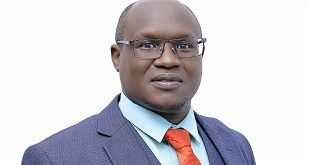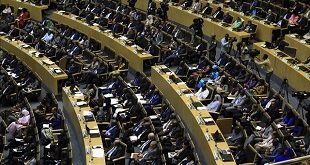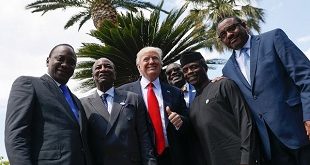
By Andrew M. Mwenda
Attempts to make Mandela a secular saint and set his actions apart from the general experience in Africa distort history
Two weeks ago, I committed “sacrilege” on my television show on NTV when I said that many of the things former South African president, Nelson Mandela, did and is being praised for have been done by other African leaders.
One of the leaders I mentioned is our own President Yoweri Museveni. Since then, I have been receiving a barrage of criticism on social media and my private email saying: “how dare you compare Museveni with Mandela” or “How can you compare Mandela with other African leaders.” Attempts to “de-Africanise” Mandela largely by the West have been effective.
I lack religious faith; so my views on anything are always based on evidence rather than faith. While Mandela is my hero of the first rank, I do not consider him a saint but a shrewd politician and wise statesman. I have read his strength and limitations, his triumphs and failures, his compromises and what necessitated them. I have learnt that a lot of his actions were dictated by political necessity rather than by magnanimity.
Many hailed Mandela as the first African president to leave power peacefully after “one term”. Yet it was Gen. Akwasi Afrifa of Ghana who organised a democratic election and handed power to Kofi Busia in 1969 after a few months as president.
The second was Gen. Olusegun Obasango of Nigeria who ruled for only four years and handed power to Shehu Shagari in 1979. The third was Jerry Rawlings in Ghana in 1979 although he grabbed it again in 1981.
Other African leaders left power voluntarily long before term limits became fashionable: Leopold Senghor of Senegal (1980), Ahmadou Ahidjo of Cameroon (1982), Julius Nyerere of Tanzania (1985), Siaka Stevens of Sierra Leone (1985) and Aristides Pereira of Cape Verde (1991).
The greatest was Gamal Abdel Nasser of Egypt. In 1967, he resigned the presidency by taking personal responsibility for the defeat of Arab armies by Israel during the six-day war. However, he was forced back to office by popular protests that paralysed Cairo and Alexandria for three weeks.
Mandela is credited for working with former enemies like Mangosuthu Buthelezi and F.W. de Klerk. He is also credited with supporting the near all-white South Africa rugby team, Springboks. He is praised for visiting former president Botha and Betsie Verwoerd, the wife of the former South Africa president who had imprisoned Mandela for life, Hendrik Verwoerd.
These efforts are presented as unique to Mandela. Yet other African leaders have done the same. In this article I will focus nearer home on Yoweri Museveni of Uganda and Paul Kagame of Rwanda.
Museveni’s current minister of state for foreign affairs, Okello Oryem, is a son to the president whom he overthrew, Tito Okello. The Chief of Defense Forces of the UPDF, Gen. Katumba Wamala, was a soldier in the UNLA, the army that Museveni defeated to capture power.
The chief of logistics and engineering, Maj. Gen. Charles Otema, one of Museveni’s favorites, was also in UNLA. Col. Walter Ochora was a UNLA officer who then joined the rebel UPDA, which fought a bitter civil war against Museveni. He later became one of Museveni’s closest allies in Acholi region till his death in 2011.
In 2012, President Museveni asked me to accompany him on a Sunday morning to visit former president Milton Obote’s widow, Miria Obote at her home in Kololo. This was a great gesture given the history of animosity between the two leaders.
Museveni and Miria spent over two hours reminiscing about the good times they shared as exiles in Tanzania rather than their contested political past as I sat and listened in silent wonderment. Later Museveni ordered the reconstruction of Obote’s grave, Obote’s mother’s house, the renovation of Obote’s house in Kololo, and the construction of Obote’s home in Akokoro village. (See photos on page 20-21)
And Museveni did this after, not before an election year and was therefore not seeking votes. In fact I wanted to take pictures of this historic occasion and Museveni refused, saying he was not doing it for public consumption thereby denying Uganda images of one of the most memorable episodes in our political history.
Today, Obote’s last born, Ben Opeto, has been hired as a staff officer in state house working directly under the president. Equally Museveni appointed the son of Idi Amin, Taban Amin, to a senior position in Internal Security Organization. Museveni has also provided sustenance to Amin’s family. Amin was one of Museveni’s strongest enemies.
Some of Joseph Kony’s former rebel commanders such as Brig. Kenneth Banya and Brig. Sam Kolo have been integrated into the UPDF with their ranks given to them by LRA; and live in government houses, drive official cars and earn salaries. Across the 28 years of his rule, Museveni has worked with many former enemies, many of whom had organised rebellion against his government – Charles Alai, Eteker Ejalu, Chris Rwakasisi, etc.
Many of the compromises and reconciliations Mandela did were absolutely necessary to assure rich whites of their security so that they don’t leave South Africa, a factor that would have caused economic collapse. One can therefore say they were imposed upon him by circumstances. Indeed, at a very personal level, Mandela failed to reconcile with his wife, Winnie, who sacrificed everything to keep his name and struggle alive.
It tells a lot that Mandela reconciled politically with apartheid but not personally with Winnie. Yet many of the reconciliations that Museveni and Kagame have done were not imposed upon them by political necessity but personal magnanimity. They could have ignored such gestures at little or no political cost to their administrations.
In 2012, Rwanda’s former Prime Minister, Jean Pierre Rwigyema, returned from exile and is now in the East African Legislative Assembly. The current Commissioner General of Prisons in Rwanda, Maj. Gen. Paul Rwarakabije and the current deputy Chief of Staff of the reserve force, Brig. Gen. Jerome Ngendahimana were commander and chief of military intelligence of the FDLR respectively, the rebel movement fighting Kigali from DRC. The executive assistant to the First Lady, Jeannette Kagame, is a daughter of Theodore Nsikubwabo, the president of Rwanda during the 1994 genocide etc.
The Western media will not obsess over these and many other similar examples of reconciliation across Africa because they disprove the narrative it seeks to promote of African leaders as bloodthirsty hounds – a narrative we African elites have bought line hook and sinker.
amwenda@independent.co.ug
 The Independent Uganda: You get the Truth we Pay the Price
The Independent Uganda: You get the Truth we Pay the Price


